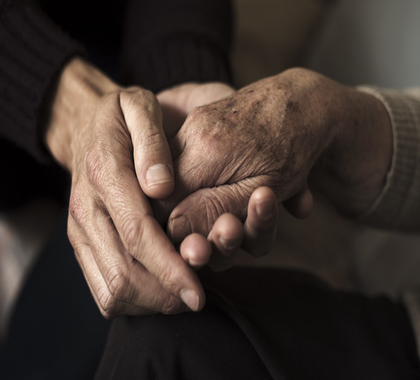David Brodsky says he is saddened and frustrated—saddened because he lost the companionship of his 81-year-old wife, Caroline, to Alzheimer’s disease, and frustrated because she had shown remarkable improvement thanks to treatment using a brain stimulation device that has been effectively stonewalled by the U.S. Food and Drug Administration (FDA).
“Six months after the treatment, it was like she didn’t even have Alzheimer’s disease,” Brodsky said. “Prior to the treatment, she did not know the name of the street where she lived or the names of her children or grandchildren. She was incapable of functioning in a realistic way. After the treatment, not only did she know who she was or where she was, she wanted to start driving again, carry on with travel, and have a normal family life. It was amazing.”
Brodsky’s case is an example of what the Reciprocity Ensures Streamlined Use of Lifesaving Treatments (RESULT) Act is intended to address.
Enrolled in Research Trial
After her diagnosis in 2011, Caroline was enrolled in a preclinical research trial in Boston for the neuroAD Therapy System, a treatment by the Israeli company Neuronix. The treatment uses repetitive transcranial magnetic stimulation (rTMS) and cognitive training to improve memory. Caroline was one of 45 early-stage patients who underwent daily one-hour sessions for six weeks.
“Her ADAS-Cog score improved five points,” Brodsky said. “They told us to come back in six months, and [at that point] she was still doing well.”
Brodsky says in 10 months Caroline’s memory began regressing and the researchers treated her again. Improvement was even stronger than the first time.
Results Attracted Investors
Brodsky, a successful businessman who serves on several corporate boards, was so impressed with the results he decided to invest in the company. Brodsky says he and his friends, also impressed with Caroline’s results, raised $15 million to help Neuronix conduct clinical trials to get FDA approval.
Prospects looked strong. The treatment was supported by leading experts on noninvasive brain stimulation at Harvard and the Cleveland Clinic. FDA gave the device fast-track “de novo” approval, meaning it would not have to undergo years of trials, because it is similar to other approved devices deemed safe and effective. Additionally, the treatment was being successfully used at clinics in France, Israel, and Italy, and a South Korean study showed promising results.
Trials began at nine teaching hospitals in the United States. Caroline was unable to participate, however, because of her prior involvement. Brodsky considered moving to Israel to continue treatment for his wife, but given all the positive signs for U.S. approval, plus the encouragement of her doctors, he decided to stay put.
Then everything changed.
FDA Created Roadblock
What Brodsky thought would be expedited approval now seemed like a process that could take years.
“The review was not done in an expedited fashion,” Brodsky said. “It took at least a year and a half before the FDA even reviewed the file.”
It had been four years since Caroline’s initial treatment, and her memory began rapidly deteriorating, Brodsky says. Caroline required 24-hour supervision and ultimately had to be moved to a memory care center with round-the-clock care.
“My family gained three years of life with this treatment,” Brodsky said.
Caroline was subsequently treated with prescription drugs, but none brought the improvement she had with rTMS, Brodsky says.
Application Nixed
The FDA has not approved a new therapy for Alzheimer’s disease in 15 years, according to a June 20, 2018 report in Healio Family Medicine. On March 27, 2019, an FDA advisory panel rejected Neuronix’s application to market its neuroAD Therapy System without further trial.
“The sponsor needs to do a properly designed, larger, longer trial,” Alzforumquoted panel member David Knopman as saying.
The entire team of advisors, doctors, patients, and investors who attended the eight-hour hearing were stunned to the point of tears, Brodsky says. They were particularly frustrated by the panel’s refusal to consider the Korean study and the five-year success of clinics in Europe and Israel, Brodsky says.
The panel looked at only a narrow range of results from the U.S. trials and indicated no concern over the safety of the procedure, Brodsky says.
“It has been an emotional and financial struggle because the technology shouldn’t be kept away from the world,” Brodsky said. “Most devices depend on an FDA stamp of approval, and when the FDA comes in and says it is perfectly safe but we recommend another year of study, it doesn’t bode well.”
Millions Needed for More Testing
Brodsky says investors will have to raise an additional $10 to $15 million to conduct a new trial.
“The data is there, and yet here we are struggling to keep the company alive,” Brodsky said.
Investors are working with investment bankers and venture capital firms to raise the additional money, Brodsky says.
“Unless I can find an appropriate investment partner, it is all over for the company,” Brodsky said.
Cites ‘Real-Life Results’
Brodsky says the RESULT Act could be a game-changer for treatments such as the rTMS treatment that helped Caroline.
“We have real-life results in France, Italy, and Israel: 500 cases showing at least a three-point change on cognitive scores,” Brodsky said. “A treatment costs 6,000 euros and can buy several years of independent life. The money is far less than what drug treatment can cost and the $8,000 in costs per month for assisted care.”
Brodsky says the FDA should look more carefully at device effectiveness.
“They failed to consider the much more positive 12-week results from the U.S. trials, and the ADAS cog scores that they used don’t relate to function,” Brodsky said. “The FDA should consider the quality of life, that patients can live independently and function.”
AnneMarie Schieber ([email protected]) is managing editor of Health Care News.





